COVER STORY

Chris Donaldson '14 looks out over the Flaming Mountains near Turpan in Xinjiang, China, in 2012. Photo: Cornell Abroad.
Set course for global. Engage.
New era will revitalize the curriculum and shape the student experience through a more international lens
Shelby McClelland '15 spent summer 2013 on a French goat farm as part of a College of Agriculture and Life Sciences (CALS) exchange program. And this past fall, she began taking master's courses in agroecology in France as part of a partnership between CALS and the French university ISARA-Lyon.
"Being open to change and new situations is an essential part of this study abroad experience," she wrote on her blog.
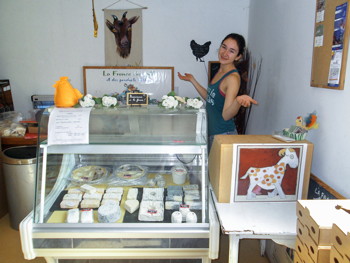
Shelby McClelland '15 during her internship at La Cheverie de l'Ecaillon, a large-scale goat cheese producer in northern France. Photo: Cornell Abroad. See larger image
President David Skorton and Fredrik Logevall, vice provost for international affairs, seek to make meaningful international experiences a common theme for students in a new era of greater focus on Cornell's global presence, both on campus and abroad.
Cornell's strategic goals – including becoming a top-10 world research university – "demand a global presence – a commitment to international studies, to international engagement, to helping provide solutions to real-world problems," says Logevall, the Stephen and Madeline Anbinder Professor of History and director of the Mario Einaudi Center for International Studies, who became vice provost in July.
Skorton's March 2012 white paper, "Bringing Cornell to the World and the World to Cornell," urgently warned that Cornell had slipped in international competitiveness and influence over the past few decades and challenged the university to regain its global edge. He called for Cornell to internationalize the curriculum and ensure that at least half – up from 27 percent – of students have "significant international experiences" through expanded travel grants, engaged learning and research opportunities, and international partnerships.
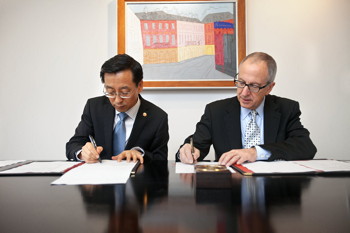
President David Skorton, right, signs a general framework memorandum of understanding with Jie Zhang, president of Jiao Tong University in Shanghai, in 2011. See larger image
Skorton pledged to support this renewed focus on internationalization with $3 million per year for five years from his discretionary fund and charged the university with generating endowments to continue that support.
A subsequent faculty task force (on which Logevall served) made more than two dozen recommendations to expand the university's already extensive international activities and address areas where Cornell underperforms compared with peer institutions.
This past fall, Logevall issued a "Call to Action" detailing his priorities. He spoke to university council members and trustees in October about his vison and in November addressed a broad campus audience during International Education Week.
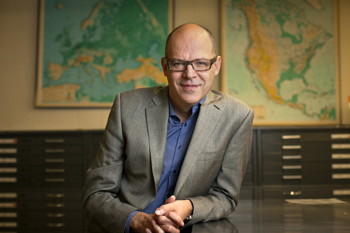
Fredrik Logevall, Cornell vice provost for international affairs. See larger image
New urgency for a global Cornell
Cornell, international in scope and aspiration since its founding, engages in hundreds of research projects, programs, initiatives and partnerships around the world (see story, p. 7). Much of the current challenge lies in enhancing and coordinating these programs and partnerships to make Cornell truly global.
Many of Cornell's peer universities invested heavily in highly visible and focused international activities over the past 30 years; Cornell's once eminent position in international studies slipped. According to the faculty task force report, "the university has paid a high price by failing to concentrate its intellectual energies, coordinate its institutional capacities, and develop its financial resources in support of its many internationalization activities."
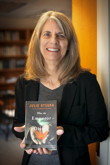
Laura Brown, senior vice provost for undergraduate education. See larger image
According to the latest Open Doors report compiled by Cornell Abroad, 1,773 Cornell students traveled to 89 countries in the 2011-12 academic year to study, conduct research or participate in a faculty-led experience as part of a Cornell program. Cornell has 235 official memoranda of understanding with academic institutions across the globe; faculty, students and staff are also engaged in a vast array of less formal cooperative efforts and joint activities with their international counterparts and colleagues.
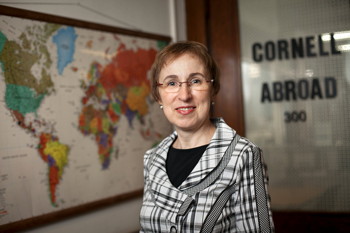
Marina Markot, director of Cornell Abroad. See larger image
A recent university census also found that out of 201 countries (the world's sovereign states as counted in 2011), Cornell had a "significant presence" of programs and research in 177.
Failure is not an option
Logevall says the challenge for Cornell to internationalize is "urgent" because:
"It's the right thing for our students. … every education must include coming to terms with what it means to be different from yourself, to engage with other cultures.
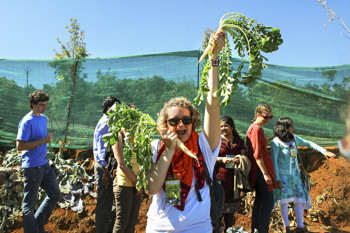
Jennifer Weidman '13 and other members of Cornell's International Agriculture and Rural Development 602 course visit Mariwali's strawberry and vegetable farm in Mahabuleshwar, India, in January 2013. Photo: A. Chan. See larger image
"We need to prepare our students to be able to claim global citizenship. We need to produce graduates who have the international experience, the language capabilities, the cross-cultural communication skills to navigate and thrive in this global economy and who grasp and live the adage that in an interconnected world, we need to understand each other better. So many of the jobs they are going to have – whether in business, education, health care or government – will be global in scope and global in nature. We need to prepare them for that world."
Priority areas
Logevall's priorities are to:
- internationalize the student experience by expanding opportunities, developing new courses and exploring a new interdisciplinary global affairs major;
- support internationally engaged faculty by strengthening the Einaudi Center and its programs and assisting colleges with recruitment and retention efforts;
- enhance Cornell's international partnerships and explore the creation of Cornell consulates – study centers or regional hubs – in select cities worldwide;
- mobilize funds for internationalization by generating new endowments; and
- create centralized university coordination of international research, teaching and engagement activities across Cornell, improving their organization and reaching more stakeholders while providing leadership through internal and external advisory councils.
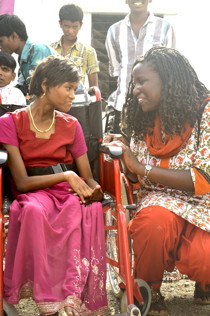
Teresa Danso-Danquah '15, right, took her interest in disability studies to Hyderabad, India as part of ILR and the Employment and Disability Institute's Global Service Learning program in summer 2013 to work with the Society for the Elimination of Rural Poverty; at left is a woman whose wheelchair was funded by the society's self-help group. Photo: Katie Klapheke. See larger image
This past fall Logevall announced the new Internationalization Council, a group of leaders from each college and school, that is charged with advancing Cornell's global dimension.
Logevall also is seeking ideas and support from international alumni. An external advisory council of alumni and friends of Cornell, chaired by Trustee Emeritus Martin Tang '70, will offer strategic advice and work to strengthen a wide range of global experiences for the Cornell community.
Working closely with Laura Brown, senior vice provost for undergraduate education, and Marina Markot, the new director of Cornell Abroad, Logevall seeks to refashion and reinvigorate international opportunities for undergraduates.
A faculty committee is investigating a cross-college global affairs major; and a new Language Education Council (LEC) will aim to keep Cornell a top university for language instruction.
During the recent financial crisis, several language programs at Cornell were cut; additionally, federal Title VI funding support for the least commonly taught language programs face restrictions and possible elimination. The LEC will play a key role in strategically strengthening Cornell's language programs, Logevall says.
Logevall also intends to stress international opportunities as early as prospective students' first campus tour. With the similar aim of opening students' eyes early on to international perspectives, selected Cornell faculty members will create first-year "gateway courses" to introduce global dimensions of various fields of study.
Changes are already happening
Cornell's decentralized structure has meant, for example, that the College of Arts and Sciences is almost completely responsible for language instruction, but a growing number of "key stakeholders are outside this college, and increasingly so," Brown says.
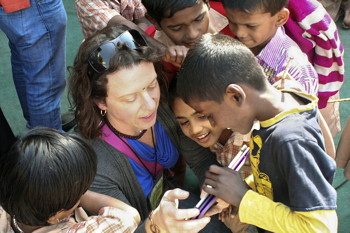
Tyson Deal shows some of the children at Pune ISKON Food Relief Foundation and Orphanage photos of themselves during her visit to India with Cornell's International Agriculture and Rural Development 602 course. Photo: P. Davies. See larger image
Brown points to the ILR School, which recently expanded its global internship opportunities and believes that its students could greatly benefit from an intensive, short-term language and culture course before heading to other countries for hands-on service learning. More immersive language courses outside the traditional semester system would give students a better context for their international experiences, she says.
For example, Donna Ramil, ILR's associate director of international programs, says the school needs a Kannada language instructor to help prepare service-learning students heading to Karnataka, India, for the summer, rather than the informal volunteer language training (by students) she arranges each year.
Brown also is working to reduce the conflicts many students encounter in their majors and required courses, which have kept many of those interested from pursuing international experiences.

Jonathan Peters '14 takes a break during a hike in Kowloon, Hong Kong. Photo: Cornell Abroad. See larger image
Now that Cornell Abroad reports to Brown, she expects to build stronger connections between study abroad and other programs central to the support for undergraduate education, including Engaged Learning + Research and the Office of Academic Diversity Initiatives, also within her purview. She hopes to bring targeted study abroad opportunities to "students whose backgrounds don't prepare them for, or whose contexts don't encourage them to study abroad." This includes underrepresented minority students and first-generation-U.S. students.
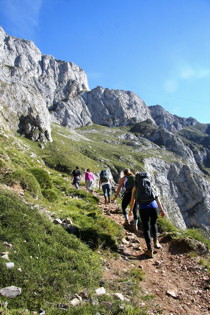
Students in the College of Engineering's immersive exchange program with the Universidad de Cantabria in Santander, Spain, hike in the Picos de Europa near Fuente D. Photo: Caroline Caglioni. See larger image
Brown also wants to add more short-term, immersive or intensive options closely integrated with students' courses of study; on the model, for example, of the international agriculture classes in India or Mexico during intersession, and how the Cornell International Institute for Food, Agriculture and Development's SMART Program provides opportunities for students to develop strategic business plans in Africa for up to eight weeks. Many such short-term programs are faculty led and closely tied to a course or major.
Markot says that Cornell's strengths are "the sheer variety" of abroad options for students and the university's commitment to provide financial aid to students going abroad. Cornell Abroad also plans to continue increasing opportunities for students during and between semesters.
Valuable abroad experiences are "about creating meaning," Markot says. "It's understanding things you cannot grasp otherwise. And I think the highest impact of education abroad, the best abroad experiences, are in providing context for complex concepts."
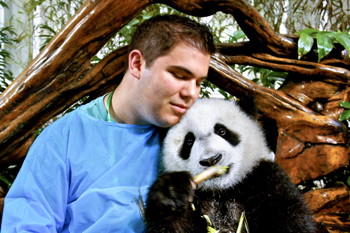
Nolan Jones '13 gets to know a 7-month-old panda cub at a breeding research base in Chengdu, Sichuan Province, China. Photo: Cornell Abroad. See larger image
Take Keri Forness '15 (Arts and Sciences), for example, who spent fall 2013 in Amman at the Jordanian Institute of Diplomacy through Cornell Abroad and the Council on International Educational Exchange's Diplomacy and Policy Studies program. She witnessed weekly protests, "usually about the economy," she says. She came to understand why Jordanians are frustrated yet "are positive overall since, in comparison to other Arab countries … their government is intact and they can live normal lives."
David Huang '14 (ILR) spent a year at Oxford University, which "showed that the study and practice of labor relations requires a comparative approach in an increasingly shrinking world," he says. "Studying abroad … made me value my time at both universities more and clarified my interests."
Cornell's international campus
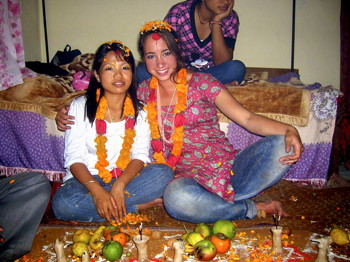
Katie Sullivan '11, right, celebrates during the Tihar Festival with a roommate during her semester in 2009 as part of the Cornell Nepal Study Program. Photo: Cornell Abroad. See larger image

Amanda Steffy '13, left, prepares to watch the St. Patrick's Day Parade in Dublin, Ireland, in 2013. Photo: Cornell Abroad. See larger image
This past fall, 4,220 international students from 115 countries were enrolled at Cornell's Ithaca campus, comprising 19.5 percent of total enrollment and marking the highest percentage in a decade (9.9 percent of undergrads, 25.2 percent of professional students and 44.7 percent of graduate students).
"If your roommate is from Brazil, then that's an international experience – one that may be more significant to a student than going abroad for a semester or for three weeks," Brown says.
Skorton seeks to boost the number of students enrolling at Cornell from Africa, Europe and Latin America while also calling for more need-based undergraduate financial aid for international students.
Defining terms
A Feb. 10 symposium, planned by the Einaudi Center and Cornell Abroad, will explore how to define what constitutes "meaningful" or "significant" international experiences.
"I think it does involve a certain period of time in a given country," Logevall says, "that, in many instances, it includes language capacity that's built in. … I do think we have to have a fairly high bar when we define it."
It's crucial for Cornell to "be the exemplary international university," he says. "It matters to us in terms of the kinds of students we produce and attract. We also want to hire and then retain the best faculty anywhere in the world ... and, more and more, I think they will come from overseas or will have spent time overseas."
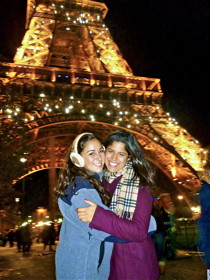
Rebecca Urquiola '14, right, at the Eiffel Tower in Paris in 2012. Photo: Cornell Abroad. See larger image
"Studying abroad reshaped my way of thinking and gave me a sense of a second home – a second self – that has become the definition of my Cornell experience," says Moniek van Rheenen '13 (Arts and Sciences), who spent her junior year in Spain with Cornell Abroad's Seville program. "I thought I would learn the most about the Spanish language and culture, but my greatest lessons were what I learned about myself: my passion for teaching languages, my willingness to expand well beyond my comfort zone, [and] the realization that there's so much more to our world and to the people who inhabit it."
For Matt Glocz '14 (School of Hotel Administration), spending a year abroad "was the only way I could truly take the foundation in Italian I gained here to the next level and become fluent in the language." Glocz participated in Cornell Abroad's program in Bologna, Italy, and also spent a year on a full linguistic immersion program at the University of Bologna.
"If you're even thinking about going abroad, do it," he says. "But don't just study abroad for the sake of getting away and partying for a semester – really try to get that immersive, cultural experience and live like a local. There's a difference."
More information:
international.cornell.edu
cornell.edu/portraits/fredrik-logevall
cornell.edu/provost/priorities.cfm